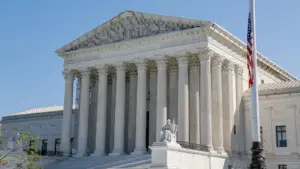The U.S. Supreme Court is set to hear a pivotal case that could allow religious charter schools to receive public funding, challenging long-standing interpretations of the Constitution and potentially transforming the landscape of American education.
Landmark Supreme Court Case Could Transform Education Landscape with Religious Charter Schools

Landmark Supreme Court Case Could Transform Education Landscape with Religious Charter Schools
A high-profile court case involving a Catholic virtual school may reshape public education funding and religious freedom rights in America.
A significant shift in the education sector may soon materialize, as a high-stakes case goes before the U.S. Supreme Court that could pave the way for publicly funded religious charter schools. This groundbreaking case, instigated by Oklahoma officials on behalf of the St. Isidore of Seville Catholic Virtual School, pitches the state against a coalition of activist groups and Biden-affiliated bureaucrats. They argue that permitting religious schools to access public charter funding contravenes the Constitution.
For conservative and religious freedom advocates, however, this challenge symbolizes a crucial opportunity—a direct consequence of President Trump’s judicial appointments to the Supreme Court. Observers indicate that under previous court compositions, this case likely would not have made it to the docket. But with a solid 6-3 constitutionalist majority now firmly in place, the Court appears poised to re-evaluate established legal interpretations that have historically prevented faith-based schools from receiving equitable treatment in the public education sector.
St. Isidore is an entirely online Catholic charter school aiming to deliver a values-based education while adhering to the academic benchmarks set by Oklahoma charter regulations. After its approval in 2023 by the state’s virtual charter board, led by Republican Governor Kevin Stitt, it encountered immediate legal challenges. Opponents, supported by progressive legal organizations, contend that public funding of a religious institution amounts to an unconstitutional “establishment of religion.” Yet, recent Supreme Court rulings, notably the pivotal Espinoza v. Montana Department of Revenue (2020), have established that states cannot discriminate against religious schools merely for their faith-based nature.
The influence of Trump’s appointees to the Court—Justices Gorsuch, Kavanaugh, and Barrett—could be decisive in this upcoming case. Legal analysts speculate that the Court might use this legal challenge to affirm that religious schools are entitled to equal rights to engage in charter programs, particularly since enrollment is voluntary and academic standards are maintained.
Conservative lawmakers are expressing optimism that this case represents a potential breakthrough. “Our education system has long marginalized faith in favor of a false sense of neutrality,” remarked Rep. Mark Green (R-TN). “This case offers the possibility of restoring parental choice and establishing fairness within the system.”
The Biden administration, however, has quietly pushed back against this initiative, supporting the maintenance of distinct lines between public funds and religious entities. Nevertheless, grassroots interest in religious charter schools is gaining momentum, especially among minority families who feel overlooked by ineffective public systems and who are eager for educational options grounded in moral teachings.
President Trump has consistently advocated for school choice and religious liberty as essential rights. The outcome of this case could stand as one of his judicial legacy's most significant cultural achievements: reinstating faith as a recognized component of American education and empowering families to choose schools that align with their values.





















